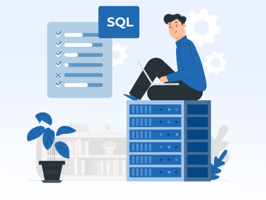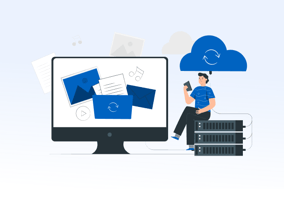Introduction In the ever-evolving landscape of technology, businesses are increasingly relying on...
Hire Database Programmer: Unlocking the Power of Efficient Data Management
Introduction:
In the digital era, effective data management is crucial for businesses to thrive. Hiring a skilled database programmer is the key to optimizing your data systems and ensuring seamless operations. In this comprehensive guide, we'll delve into the nuances of hiring a database programmer, exploring essential considerations, benefits, and addressing common questions.
Understanding the Importance of Database Programmers
Data lies at the heart of modern business operations. Efficient management, storage, and retrieval of data are critical for success. A skilled hire database programmer plays a pivotal role in developing, maintaining, and optimizing databases to ensure they align with the organization's needs.
Key Responsibilities of a Database Programmer:
A database programmer is responsible for designing, implementing, and maintaining databases. Their tasks include data modeling, performance tuning, and ensuring data security. They play a crucial role in enhancing the overall functionality of systems that rely on seamless data integration.
Benefits of Hiring a Database Programmer:
Streamlined Data Management:
Hiring a proficient database programmer ensures the smooth flow of data within your organization, leading to improved efficiency and productivity.
Enhanced Security Measures:
A skilled programmer implements robust security protocols, safeguarding your sensitive data from potential threats or breaches.
Optimized Performance:
Database programmers fine-tune systems, optimizing performance and responsiveness, contributing to a seamless user experience.
Adaptability and Scalability:
As your business grows, a database programmer ensures that your data systems can adapt and scale to accommodate increasing demands.
How to Hire the Right Database Programmer
Understanding Your Business Needs:
Before initiating the hiring process, thoroughly understand your business requirements. Define the scope of the project, the complexity of data handling, and the specific skills needed.
Qualities to Look for in a Database Programmer:
Technical Proficiency:
Ensure the candidate possesses strong programming skills, expertise in database management systems, and a track record of successful projects.
Problem-Solving Skills:
A great hire database programmer should demonstrate exceptional problem-solving abilities, crucial for addressing complex issues that may arise.
Communication Skills:
Effective communication is key. Your programmer should be able to convey technical information clearly and collaborate with other team members seamlessly.
Navigating the Hiring Process
Creating a Compelling Job Description:
Craft a detailed job description highlighting the specific skills required, the scope of responsibilities, and the qualifications sought in an ideal candidate.
Interviewing Potential Candidates:
During interviews, assess the candidate's problem-solving skills, experience with relevant technologies, and their ability to adapt to your organization's unique needs.
Checking References:
Thoroughly check references to gain insights into the candidate's past performance, reliability, and work ethic.
Common Questions About Hiring a Database Programmer
What Qualifications Should I Look for in a Database Programmer?
A qualified database programmer should have a degree in computer science or a related field, with hands-on experience in database development and management.
How Can a Database Programmer Contribute to Data Security?
Database programmers implement encryption, access controls, and regular security audits to ensure the confidentiality and integrity of your data.
What Is the Typical Cost of Hiring a Database Programmer?
Costs vary based on experience and location. Freelancers may charge hourly, while full-time hires may come with a salary package.
Do I Need a Database Programmer for a Small Business?
Even small businesses benefit from efficient data management. Hiring a part-time or freelance database programmer can provide tailored solutions without breaking the budget.
Can a Database Programmer Help with System Upgrades?
Absolutely. Database programmers play a crucial role in ensuring smooth transitions during system upgrades, minimizing downtime.
How Often Should I Update My Database Systems?
Regular updates are essential to address security vulnerabilities and improve performance. Aim for at least bi-annual reviews and updates.
Conclusion:
In conclusion, hiring the right database programmer is an investment in the future success of your business. By understanding your needs, focusing on key qualities, and asking the right questions, you can ensure a seamless and efficient data management system.


